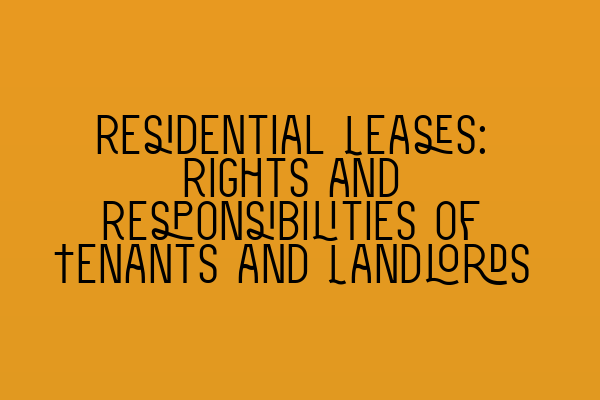[Blog Post]
Residential Leases: Rights and Responsibilities of Tenants and Landlords
As a tenant or landlord, understanding your rights and responsibilities is crucial when it comes to residential leases. A residential lease is a contractual agreement that outlines the terms and conditions under which a property is rented out. Whether you are renting a property or leasing it out, being aware of your rights and responsibilities will help create a smooth and mutually beneficial living arrangement. In this article, we will explore the key rights and responsibilities of both tenants and landlords in residential leases in the UK.
1. Tenant’s Rights and Responsibilities
As a tenant, it is essential to be aware of your rights. The first and foremost right you have is the right to occupy the property undisturbed during the lease term, provided you pay the rent and adhere to the terms of the agreement. Additional rights include the right to a safe and habitable living environment, which means the landlord must maintain the property to a certain standard, ensuring essential facilities like heating, water, and electricity are in working order.
Tenants also have the right to privacy. Landlords cannot enter the property without proper notice, except in the case of emergencies. It is crucial for tenants to be aware that unauthorized eviction or harassment from the landlord is unlawful. If you feel your rights are being violated, it is advisable to seek legal counsel to protect your interests.
In terms of responsibilities, tenants have a duty to pay rent on time and in full. They are also expected to keep the property clean and tidy, reporting any necessary repairs or maintenance issues promptly to the landlord. It is important to note that tenants are responsible for any damage they cause to the property beyond normal wear and tear.
2. Landlord’s Rights and Responsibilities
Landlords also have certain rights and responsibilities when it comes to residential leases. They have the right to receive rent on time and in full, and to have their property treated with respect. A landlord has the right to conduct periodic inspections to ensure the property is being properly maintained. However, landlords must provide proper notice to tenants before entering the property, typically 24 to 48 hours, unless in cases of emergency.
In terms of responsibilities, landlords have a duty to maintain the property to a certain standard, ensuring it is safe and habitable. This includes promptly attending to repairs and maintenance issues that may arise during the tenancy. Landlords are also responsible for ensuring compliance with all relevant health and safety regulations and providing tenants with necessary safety certificates, such as gas and electric safety certificates.
It is important for landlords to understand that they cannot evict a tenant without following the proper legal procedures. If a landlord wishes to regain possession of the property, they must serve the tenant with a valid notice and obtain a possession order from the court if necessary.
3. Seeking Legal Assistance
Navigating residential leases can sometimes be complex, and both tenants and landlords may encounter legal challenges. It is crucial to stay updated on current property laws and seek professional advice when needed. SQE Property Law & Land Law is a reputable law firm that specializes in property law matters, offering comprehensive legal assistance to both tenants and landlords.
For further guidance on updates in UK property laws and key changes, refer to our article: [Updates in UK Property Laws: Key Changes and Implications]. It provides valuable insights into recent developments that may impact residential leases.
If you’re facing legal challenges in property transactions, our comprehensive guide, [Legal Challenges in Property Transactions: A Comprehensive Guide], can assist you in navigating through potential pitfalls and ensuring a smooth process.
To dive deeper into lease laws in the UK, including essential guidelines for both tenants and landlords, our article [Navigating Lease Laws in the UK: Essential Guidelines for Tenants and Landlords] provides insightful information for a better understanding of lease agreements.
For those seeking to ace property law questions and avoid common pitfalls, our article [Dominate Property Law Questions: Avoiding Common Pitfalls] offers valuable tips and strategies to enhance your knowledge and preparation.
Lastly, our article [Land Law Revision Tips: Ace Your Exam Preparation] provides essential revision tips to help you excel in your land law exams.
Remember, understanding your rights and responsibilities as a tenant or landlord is crucial for a smooth and harmonious living arrangement. Seeking legal advice when needed ensures that you are well-informed and protected under the law.
For expert legal assistance in property and land law matters, contact SQE Property Law & Land Law today.
__[Call to Action]__
Contact SQE Property Law & Land Law now to ensure you’re well-informed and protected when it comes to residential leases. Our team of experienced solicitors can guide you through the complexities of lease agreements, provide legal advice, and protect your interests. Don’t hesitate, get in touch with us today!
[End of Blog Post]
